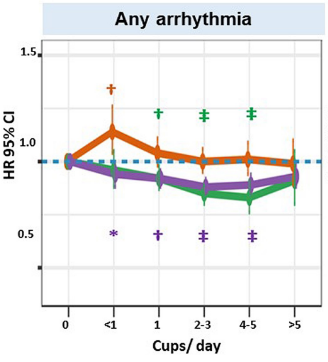This work coincides with a substantial body of research supporting that drinking coffee reduces cardiovascular disease risk and even the overall mortality rate. The mechanism by which coffee exerts these beneficial effects is still unknown. Some have suggested the protective characteristics may be due to coffee's rich antioxidant content, potential to improve insulin sensitivity, ability to modulate lipid metabolism, anti-inflammatory properties, and influence on endothelial cells resulting in improved blood flow. One key component is chlorogenic acid which is a polyphenol anti-oxidantant compound. Another, of course, is the stimulant caffeine. An open question is whether caffeine is central to the reduction in health risk.
A new study partially addressed this question by investigating the impact of different coffee preparations — decaffeinated, ground, and instant (the latter two are caffeinated) — on cardiovascular health and mortality, utilizing data from the UK Biobank. Over 449,563 participants were followed for an average of 12.5 years. The complete UK Biobank database consists of 502,521 individuals, but those already with arrhythmias or cardiovascular disease (CVD) were excluded.
Coffee consumption was self-reported into six daily intake categories, consisting of 0, <1, 1, 2–3, 4–5, and >5 cups/day. Participants also classified the subtype of coffee they drank whether decaffeinated, ground, or instant. Ground coffee is made from coffee beans that have been ground up, and then brewed with hot water which extracts the coffee flavors from the grounds which do not dissolve. Instant coffee has already been brewed and then freeze dried, and as a result can be added directly to hot water where it dissolves. In decaffeinated coffee, the caffeine is removed from the beans which can then be made into grounds or instant coffee.
This study examined the relationship between different coffee types and the development of cardiovascular (CV) issues. The researchers focused on people who developed CV diagnoses over time, comparing them to those who remained healthy. They specifically analyzed how coffee subtypes affected the likelihood of developing arrhythmias (e.g. atrial fibrillation), cardiovascular disease (CVD), and the risk of mortality. CVD included coronary heart disease (where heart arteries are narrowed), heart failure (where the heart can't pump blood effectively), and ischemic stroke (caused by a blocked artery in the brain).
All three coffee types were associated with reduced CVD risk and mortality in a statistically significant fashion (see Figure 1). The dose-response curves were relatively flat showing significant risk reduction at even <1 cup per day and a modestly larger effect at 2-3 cups/day, with the same or slightly smaller effect at higher coffee consumption. Surprisingly, ground coffee had a much stronger impact on reducing cardiovascular disease (CVD) and mortality than both instant (caffeinated) and decaffeinated coffee (Figure 1).
On the question of the importance of caffeine, the answer depends on the type of caffeinated coffee. The CVD risk reduction was similar between instant (caffeinated) coffee and decaf, but grounds (caffeinated) coffee showed greater risk reduction. Presumably, the decaffeinated category consisted of some combination of grounds and instant decaffeinated coffee.
The story was different for the arrhythmias. Ground and instant coffee, but not decaffeinated, reduced the risk of arrhythmias (Figure 2). For the impact of caffeinated coffees on arrhythmias, there was more of a dose-response with 2-3 cups showing are more sizeable risk reduction compared to <1 compared to the CVD curve. Also, there was little to no difference between grounds and instant (caffeinated). These results suggest more strongly that caffeine may be the critical coffee ingredient that reduces arrhythmia risk.
The authors conclude as follows:
“In this large prospective cohort study, consumption of instant, ground, and decaffeinated coffee subtypes, particularly at 2–3 cups/day, was associated with significant reductions in incident CVD and mortality. Arrhythmia reduction was seen with caffeinated but not decaffeinated coffee. Mild–moderate coffee intake of all types should not be discouraged but rather considered part of a healthy lifestyle.”
They do not dwell on the instant versus grounds difference for CVD; both contain caffeine although grounds coffee generally contains more. One possibility is that the chemical composition of the two may differ because certain chemicals (e.g. polyphenol anti-oxidants) may be lost during the processing steps (e.g. freeze drying) of making instant coffee.


No comments:
Post a Comment